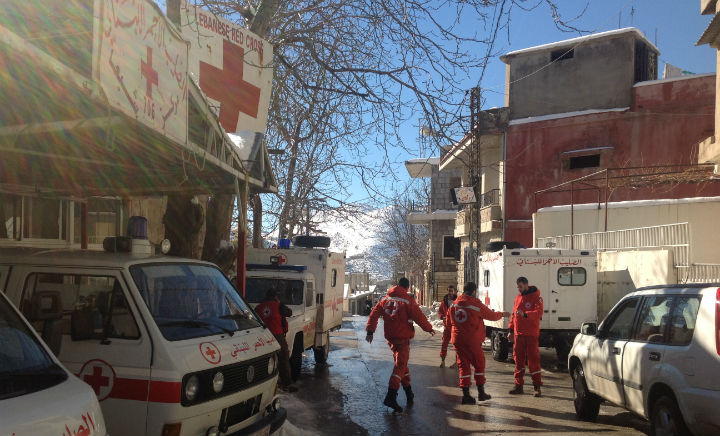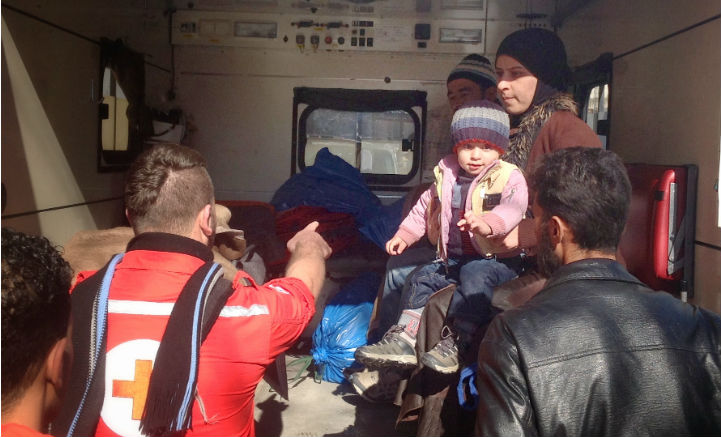Increasing the capacity of local actors: the Lebanon case
Adopted by more than 30 of the biggest aid providers and donors – including the European Commission and numerous EU Member States – at the World Humanitarian Summit in May 2016, the Grand Bargain commits actors to provide 25 per cent of global humanitarian funding to local responders by 2020, as directly as possible.
Capacity building - the key to localisation
Discussions around the localisation of aid have prompted the humanitarian community to rethink how it engages with national and local actors. As a local to global humanitarian network, with distinct but mutually reinforcing roles for responders at different levels, the Red Cross Red Crescent Movement has long worked to strengthen local humanitarian action by supporting the organisational development of National Red Cross and Red Crescent Societies.

About the Lebanese Red Cross
Lebanon has been through several conflicts, wars and political crises since 1975. As a neighbouring country, it has been hit especially hard by the Syria crisis. The Lebanese government estimates that approximately 1.5 million Syrian refugees are living in Lebanon. With a population of only 4.5 million, it is the country with the highest ratio of refugees per capita in the world. Resources are dwindling and families are finding themselves unable to meet their basic needs.
The Lebanese Red Cross is the largest national humanitarian organisation in the country, providing services to more than 500,000 people each year. Lebanese Red Cross volunteers and staff come from across Lebanon’s social, ethnic and religious spectrum. Today, the Lebanese Red Cross has a vital role as an auxiliary to the fragile public authorities and as the mandated organisation for the provision of emergency medical services. Its access, acceptance, and unifying role make it uniquely placed to reach the sick, injured and vulnerable in difficult-to-reach locations, and to contribute towards building the resilience of communities.
An equal partnership with local actors in the driving seat
In 2013, the Lebanese Red Cross requested capacity building and support from the Norwegian Red Cross, following assessments that indicated a need to review their financial management systems. The effects in Lebanon of the ongoing Syria crisis have seen an increase in the demand for Lebanese Red Cross assistance. Coupled with a sudden tripling of the organisation’s budget, this put excessive pressure on their existing financial systems and structures, which were no longer fit for purpose.
This untenable situation was jeopardising the continuity of the Lebanese Red Cross’ humanitarian services and placing great strain on its relationships with stakeholders, leading the Secretary General to identify an urgent need for rapid and radical change.
The partnership between the Lebanese Red Cross and the Norwegian Red Cross aimed to reduce the Lebanese Red Cross’ dependency on donors while increasing their ability to address local needs.
With the strong, long-term commitment of the Lebanese Red Cross’ leadership, the Norwegian Red Cross became a strategic partner providing expert technical support, while fostering ownership and accountability. Crucially, the Lebanese Red Cross led the change process and was the sole decision-maker, defining the time-line, deliverables, priorities, and approach. The financial reform process was launched in late 2014, with long-term dependency avoided through the early planning of the Norwegian Red Cross’ exit strategy.
Sustainability to better address local needs
The project had two main goals: 1) to address the immediate challenges by dealing with the backlog of financial reports and payments, and 2) to build a new finance department to be fully compliant with accounting standards and legal requirements, and able to strategically advise the Lebanese Red Cross’ leadership. Just 18 months later, the financial management systems had been drastically overhauled and enhanced, providing economic oversight to inform all decision-making, and raising the organisation’s internal and external credibility. A key factor in this success was the Lebanese Red Cross’ selection of a local consultancy firm to support the change process, rather than a big multinational. Not only was the small company incentivised to show results, but it also brought the local knowledge and connections that were critical to the project’s efficiency.

“Results were achieved in less than two years,” Tone Cecilie Faugli, former team leader in the project noted, despite “the traditional assumption that organisational change takes a very long time”. Ms Faugli explained this was due to the intensity of the partnership, highlighting that the Norwegian Red Cross relied upon the Lebanese Red Cross to take the lead, and learnt to adjust their support according to the Lebanese Red Cross’ clearly expressed needs. This approach led to the further realization that taking risks, such as using a local consultancy company, proved to be the right choice, in keeping with the context.
Other National Red Cross Societies that partner with the Lebanese Red Cross have also expressed their appreciation of the significant and rapid improvements delivered by the project, complimenting the quality of the liquidity analysis and the streamlining of financial processes. "The improvements were fast and the Lebanese Red Cross now has a solid capacity, with reliable and responsive finances,” said the Regional Representative for the French Red Cross. These improvements not only reinforced the trust of its partners, but also enhanced the Lebanese Red Cross’ ability to secure its own long-term funding.
Mutual respect formed the basis of the partnership. The Lebanese Red Cross’ willingness to change, as well as the Norwegian Red Cross’ clear and pre-defined exit strategy, were some of the key factors contributing to the project’s success. Having ensured that the Lebanese Red Cross could continue to address humanitarian needs in the country and the wider region, the project is an excellent example of how strengthening local humanitarian action and considering longer-term sustainability guarantee more efficient humanitarian aid.
Basic information
Country
Lebanon
Duration
2014
Partners
Lebanese Red Cross, Norwegian Red Cross

